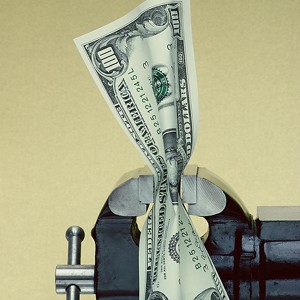 Over the past several decades, the U.S. economy has become increasingly reliant on debt. The vast majority of people take out a mortgage when they purchase a home, the vast majority of people require a big loan in order to buy a vehicle, and the number of Americans who use credit cards to make purchases at retail stores has skyrocketed over the years. It has gotten to the point where credit is the life blood of the U.S. economic system. Unless your business is a convenience store or a fast food joint, being able to accept credit cards or arrange credit for your customers is absolutely crucial. In fact, the economic boom that the United States has experienced over the last 30 years has been largely due to a rapidly expanding pool of credit. Americans have gone deeper and deeper in debt with each passing year as they pursue the American Dream. But now that so many lending institutions have substantially tightened their lending standards and now that so many Americans have such low credit scores, how is the U.S. economy going to function?
Over the past several decades, the U.S. economy has become increasingly reliant on debt. The vast majority of people take out a mortgage when they purchase a home, the vast majority of people require a big loan in order to buy a vehicle, and the number of Americans who use credit cards to make purchases at retail stores has skyrocketed over the years. It has gotten to the point where credit is the life blood of the U.S. economic system. Unless your business is a convenience store or a fast food joint, being able to accept credit cards or arrange credit for your customers is absolutely crucial. In fact, the economic boom that the United States has experienced over the last 30 years has been largely due to a rapidly expanding pool of credit. Americans have gone deeper and deeper in debt with each passing year as they pursue the American Dream. But now that so many lending institutions have substantially tightened their lending standards and now that so many Americans have such low credit scores, how is the U.S. economy going to function?
That is a very good question.
The truth is that U.S. economic growth is very highly dependent on consumer spending, and consumer spending is very highly dependent on the ability to get credit.
But today there is a money crunch.
Banks and lending institutions, having been burned so badly by the reckless lending during the early and middle part of the past decade, have really, really tightened their standards.
So now it is much harder to get a home loan, a car loan or even a credit card.
In addition, as a recent USA Today article pointed out, a record number of Americans now have very low credit scores….
Figures provided by FICO show that 25.5% of consumers — nearly 43.4 million people — now have a credit score of 599 or below, marking them as poor risks for lenders. It’s unlikely they will be able to get credit cards, auto loans or mortgages under the tighter lending standards banks now use.
Historically, only about 15 percent of Americans have had credit scores that low.
That means that the number of “bad credit risk” Americans is getting pretty close to doubling.
And that is very bad news for the economy.
If Americans can’t get loans then the U.S. economy is going to grind to a standstill.
Just consider this quote from that same USA Today article….
“I don’t get paid for loan applications, I get paid for closings,” said Ritch Workman, a Melbourne, Fla., mortgage broker. “I have plenty of business, but I’m struggling to stay open.”
If you have tried to get a home loan over the past year, then you know how frustrating that can be. On our sister site, a reader named John (who actually has very good credit) described the infuriating experience that he went through when he tried to get a mortgage….
I was just turned down for a home loan. My credit score is 799, my wife’s 804. We had $40,000.00 to put down, which was almost 30%. BUT! Our bank turned down our application! Why? They required us to have 6 months “operating expenses” in the bank after all closing costs were covered. They came up with an arbitrary number on their own, based on our bills and such. We had that amount and more on top of our closing monies. Then why were we denied the loan? Several thousand dollars were from “cash” and the bank required that “cash” be in the bank for at least 60 days or they wouldn’t consider it fluid funding. Needless to say we didn’t make the closing date and are hiring an attorney to avoid being sued (by the seller).
Can you imagine?
Now remember, this is someone with a credit score of 799.
If the process is that frustrating for him, what is it going to be like for the rest of us?
The truth is that the credit markets are broken.
In an attempt to rectify the mistakes of the past, the lending pendulum has swung all the way from “anyone can get easy credit” to “virtually nobody can get a loan”.
So now we are facing a massive money crunch.
If people can’t get loans, homes won’t be purchased, car dealerships will close, retail stores will have a horrific holiday season and the economy will come to a standstill.
The sad thing is that this is exactly the kind of thing that happened at the beginning of the Great Depression. Credit was severely tightened and all of a sudden nobody seemed to have any money and the economy seized up.
Could history be repeating itself?
Feel free to leave a comment with your thoughts on this topic below….
